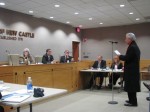Chappaqua Affordable Housing Builder Opposes More Unit Reductions

Representatives for the developer of the proposed Chappaqua affordable housing project told New Castle officials last week that a further reduction in the size of the building would be economically unfeasible.
Conifer Realty Vice President Andrew Bodewes said at the resumption of the public hearing on July 9 that the building’s operating costs would be similar even if the company were to make another reduction in the number of units because on-site management and maintenance personnel would still be required. However, fewer apartments would produce less revenue from rent and that plan “doesn’t work and it wouldn’t produce the product that we want,” he said.
“To do less apartments creates a very financially difficult situation in terms of the operating economics of the building,” Bodewes said.
The board voted to adjourn the hearing until July 23 rather than closing it when officials requested that Conifer Realty produce a financial analysis backing its claims that a smaller project would be financially unworkable. Conifer representatives planned to provide the town with the financial information requested by officials before the end of last week.
Earlier this year, Conifer Realty reduced the number of units from 36 to 28 for the project called Chappaqua Station in response to concerns that the building was too large. It is proposed for a one-third of an acre parcel on Hunts Place.
Last Tuesday’s resumption of the public hearing was the first time Conifer appeared before the town since the June 4 joint planning board and architectural review board meeting where members of both of those boards requested the developer further explore a three-story structure rather than the taller three- to four-story building.
However, the applicant’s representatives detailed in their presentation last week why the taller building, which would reach a maximum height of 46 feet and 10 inches, would better serve the town and its residents. Architect Steve Schoch said the three-story design would stretch to the property lines, eliminating outdoor recreation space and significantly reducing the size of the terraces. Amenities such as a community room, exercise room and laundry area would also be jeopardized.
It would also force the applicant to do away with the townhouse appearance of the structure.
“That concept is something that could work, it can work but it would require certain compromises,” Schoch said of the three-story plan.
Prior to opening the town hall meeting room to public comments, several board members offered statements on aspects of the plan, which revealed a potential split.
Councilman Robin Stout said he favored the concept of using the site for affordable housing but still had issues with the potential size and scope of the plan under consideration. He held out hope that those problems could be resolved.
“I don’t know that all of the objections and issues have been surmounted but I don’t think they’re insurmountable,” Stout said.
Supervisor Susan Carpenter said it has been long overdue for New Castle to develop new affordable housing units. It has been nearly 20 years since the last affordable units, at Stone Creek on the western side of town, had been built. Many of the same objections raised against that project have resurfaced during the Chappaqua Station review, she said.
Under the terms of Stone Creek’s approval, however, the units will soon revert to market rate.
While the parcel Conifer is eyeing is tight, Carpenter said it’s still doable but the site must be safe.
“People live in high-priced apartment buildings in New York City and walk out their front door onto a busy street all the time and they pay a huge amount of money to do it,” Carpenter said. “I think the building has to be safe and ambulance and fire services have had their concerns addressed.”
But two councilmen, Jason Chapin and John Buckley, were much more skeptical about the current plans. Chapin noted Conifer’s willingness to make concessions to the town but said the developer hasn’t gone far enough to reduce the building’s mass and have it blend in more effectively with the surrounding landscape.
“While this amounts to several small steps in the right direction, it’s not enough for me,” Chapin said. “I have too many reservations about the project. I also don’t think that all the conditions and standards for a special permit have been met and, therefore, the project should not move forward.”
The only board member to refrain from making comments about where they stood on the current application was Councilwoman Elise Kesler-Mottel.
Meanwhile, residents once again voiced varying opinions on the project. Chappaqua resident Steven Goldenberg said the town needs to guard against waiting for the perfect project, adding that it would be a mistake for the town to scuttle the application and wait several more years for another developer to come along.
“Chappaqua needs affordable housing,” Goldenberg said. “Is it perfect? No. Would I live there? Yes.”
But opponents said the site is too small for what’s proposed. It is also isolated, likely exposing the residents to being stigmatized.
“It’s too small of a site for what’s being proposed,” said Chappaqua architect William Spade. “It ends up creating a ghetto…because there is no other property around it.”

Martin has more than 30 years experience covering local news in Westchester and Putnam counties, including a frequent focus on zoning and planning issues. He has been editor-in-chief of The Examiner since its inception in 2007. Read more from Martin’s editor-author bio here. Read Martin’s archived work here: https://www.theexaminernews.com/author/martin-wilbur2007/
